Selecting the right insurance claims management software is essential for any insurance company that aims to streamline its operations, reduce errors, and enhance customer satisfaction. This software plays a critical role in automating the claims process, making it faster, more accurate, and efficient. With the right solution, insurers can improve their workflow, ensure compliance, and provide better service to their clients.
However, with a myriad of options available in the market, choosing the best software can be a daunting task. This blog will delve into the top insurance claims management software available today.
We will examine their key features, benefits, pricing, and how they can help your business operate more effectively. Whether you are looking to upgrade your current system or implement a new one, this guide will provide valuable insights to help you make an informed decision.
Why Insurance Management Software for your Business?
1. Improvement in Efficiency
Insurance claims management software automates routine tasks and workflows, greatly speeding up the claims process. Automation ensures that every step from initial reporting to final settlement is handled quickly and efficiently. This reduces the time it takes to process complaints, speeds up resolution, and ultimately increases customer satisfaction.
2. Accuracy
Manual data entry is prone to errors, which can lead to delays and inaccuracies in claims processing. Icms data entry mitigates these risks by automating validation processes, ensuring accurate and reliable handling of claims. This accuracy is critical to maintaining trust and transparency with customers.
3. Improved customer experience
Claims of speed and accuracy translate directly into a better customer experience. Consumers are more likely to be loyal to an insurance company that handles their claims quickly and efficiently. Icms helps provide timely updates and transparent communication throughout the claims process, significantly improving customer satisfaction.
4. Cost savings
By streamlining operations and reducing the need for multiple manual steps, icms can achieve significant cost savings. These savings result from lower administrative costs, fewer errors and faster resolution of claims, which together increase the overall profitability of the business
5. Data analysis
Many icms solutions come equipped with advanced analytical tools that provide valuable insights into claims and patterns. These insights help businesses make informed, data-driven decisions, identify areas for improvement, and optimize their feedback management strategies.
6. Compliance and safety
Insurance premiums involve addressing important personal and financial issues. Icms ensures that this data is treated securely and in accordance with industry laws and standards. Automation also facilitates the creation of accurate records and documents, which are critical for compliance audits and investigations.
7. Scalability of performance
As your business grows, so does the volume and complexity of claims. The icms solution is designed to scale with your business, accommodating increased feedback volumes without compromising performance or accuracy. This scalability ensures that your claims management systems remain robust and effective as your business expands.
10 Best Insurance Claims Management Software
1. Guidewire claimcenter
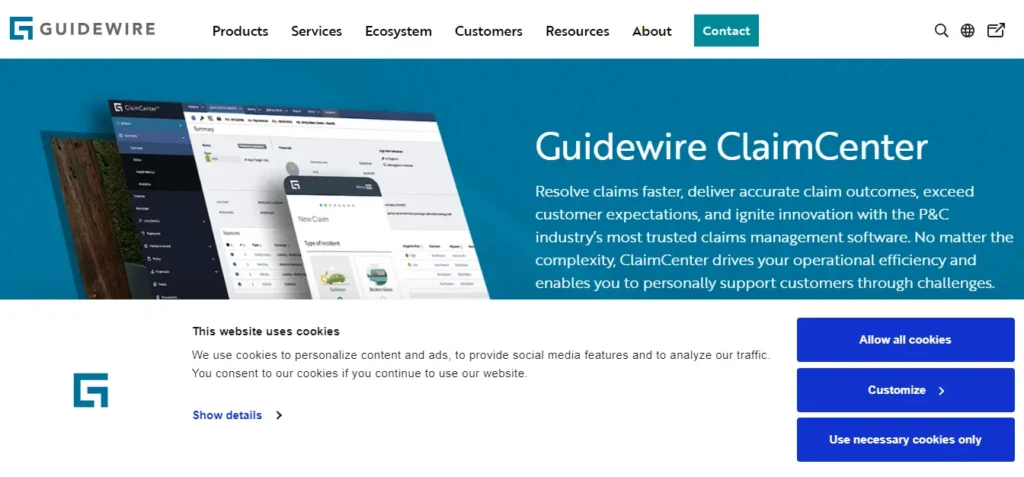
Guidewire claimcenter is a comprehensive cash management solution designed for property casualty (p&c) insurers. It provides end-to-end management of the claims lifecycle, from initial notification of loss (fnol) to resolution, and ensures a seamless and efficient claims process
FEATURES –
- automated workflows: customize the claims process with pre-defined workflows and rules.
- advanced analytics and reporting: gain insight into claims trends and performance.
- integration with other guidewire products: interact seamlessly with other modules such as the settings and payment system.
- flexible policies and procedures: customize the software to meet your specific business needs.
PROS –
- comprehensive management covering the entire claims lifecycle.
- suitable scalability for large insurers with complex requirements.
- providing strong customer support and extensive documentation.
CONS –
• high transaction costs, which limit the reach of small insurers.
• steep learning curve due to extensive features and customization options.
2. Duck creek claims
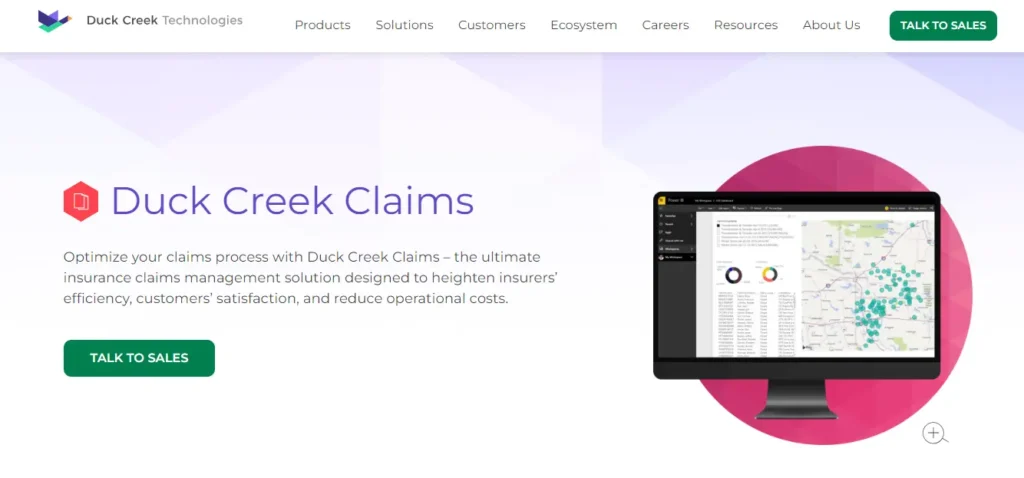
Duck creek claims is part of the duck creek suite, which provides an integrated platform for reviewing claims across multiple businesses. It emphasizes configurability and ease of use, making it suitable for a wide range of insurers.
FEATURES –
• user-friendly interface: intuitive design that simplifies the claims process.
• real-time analytics: monitor claims performance and identify areas for improvement.
• cloud-based deployment: access the platform anywhere there is an internet connection.
• third-party integration: connect other systems with data sources to enhance productivity.
PROS –
• flexible and adaptable to meet business needs.
• strong integration with tertiary structure.
• cloud-native architecture ensures high availability and scalability.
CONS –
• can be expensive for smaller insurers due to advanced features and customization options.
-effective implementation requires training and support, which can increase overall costs.
3. Insurity claimsxpress
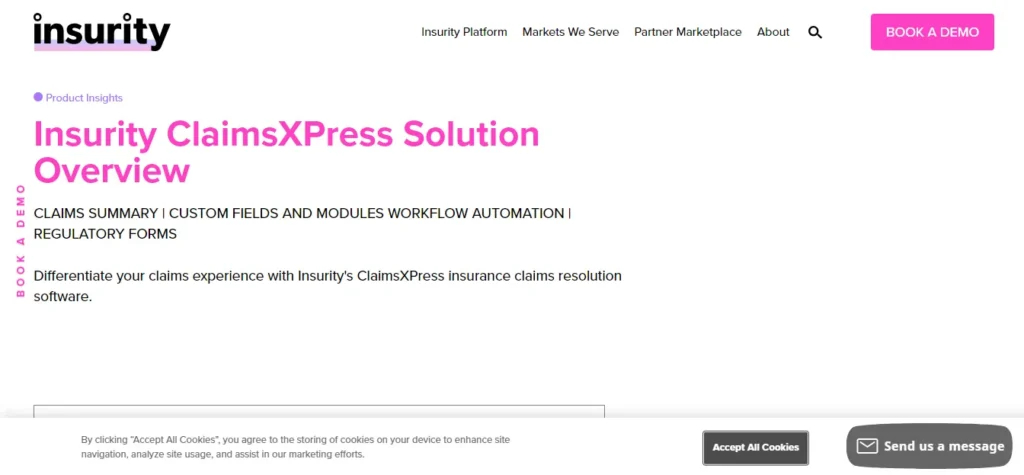
Claimsxpress by insurity is designed to streamline the claims processing of p&c insurers. It provides robust infrastructure to manage the entire lifecycle of claims from initial reporting to resolution.
FEATURES –
• automated task assignment: effectively distribute tasks to the right team members.
• real-time reports and dashboards: monitor claims performance and identify bottlenecks.
• mobile accessibility: mobile devices can be used to access the platform on the go.
• integration with planning and billing systems: ensure data flows seamlessly between systems.
PROS –
• highly customizable to meet specific business needs.
• mobile-friendly interface allows flexibility and accessibility.
• strong customer support with dedicated support.
CONS –
• implementation can be very time consuming and requires careful planning and management.
• higher cost for advanced features and customization options.
4. Origami risk

Origami risk is a versatile risk and premium management system, suitable for a variety of industries, including insurance. It provides comprehensive tools for managing claims, policies and risk profiles, making it a valuable asset for insurers. Its a combination of Insurance and IT Asset Management Software.
FEATURES –
• integrated risk management: combines claims and risk management into a single platform.
• customizable dashboard: tailor the interface to display relevant information and metrics.
• robust reporting tools: create detailed reports and analytics to gain insights.
• workflow: prepare systems with automated workflows and work assignments.
PROS –
• highly customizable to meet unique business needs.
• very versatile for different projects, making it a flexible solution.
• a strong focus on risk management, with a holistic view of risk.
CONS –
• can be difficult to install and maintain, requiring dedicated resources.
• prices may be higher for smaller organizations due to broader features.
5. Claimvantage

Claimvantage offers cloud-based claims management solutions focused on disability, life and health insurance. It ultimately enables claims processing, ensuring that claims are handled efficiently and accurately.
FEATURES –
• automated claim adjudication: speed up the claim process with automated adjudication.
• real-time analytics: monitor claims performance and identify trends.
• cloud-based platform: access to the system from anywhere with an internet connection.
• integration into system management processes: ensure seamless data flow between systems.
PROS –
• a strong focus on specific lines of insurance, to ensure quality business.
• the cloud-native platform allows for easy access and scalability.
• efficient prediction calculation reduces processing time and improves accuracy.
CONS –
-available to specific types of insurance, which may not be appropriate for all insurers.
• modifications may be required for wider applications, increasing overall costs.
6. Fineos claims

Fineos claims is a comprehensive claims management solution designed for life, accident and health insurance. It supports end-to-end claims processing and is known for its configurability and robust features.
FEATURES –
• automated workflows: set up the claims process using pre-defined workflows.
• advanced analytics: gain insight into claims trends and performance.
• integration with planning and billing systems: ensure data flows seamlessly between systems.
• customizable user interface: tailor the platform to meet specific business needs.
PROS –
• highly configurable, allowing customized solutions.
• strong focus on life, accident and health insurance, offering exceptional services.
• good integration with other systems.
CONS –
• can be expensive, especially for smaller insurers.
– implementation can be complex, requiring careful planning and management.
7. Claimcenter by systema software
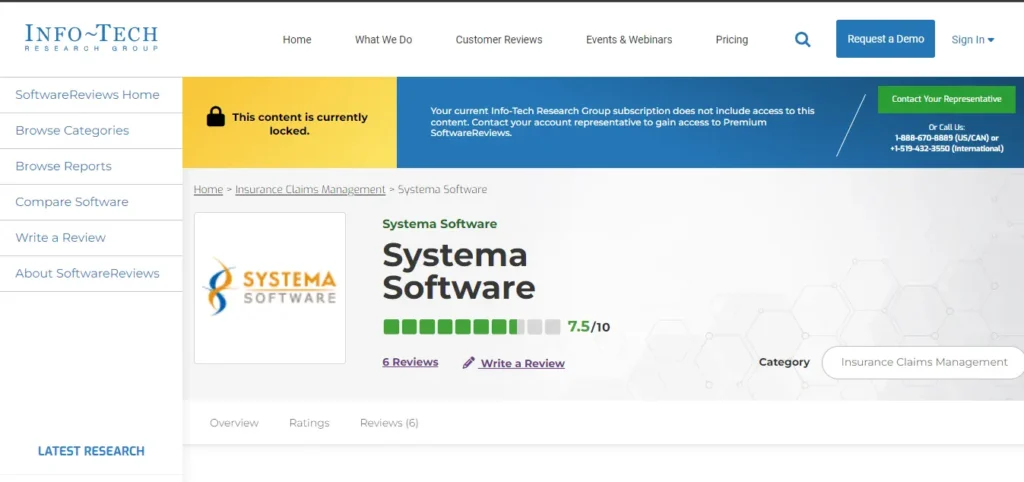
The systema software claimcenter is designed to provide p&c insurers with comprehensive claims management solutions. It provides robust functionality and scalability, making it suitable for larger organizations.
FEATURES –
• automated task management: tasks are efficiently allocated to the right team members.
• real-time reporting: monitor feedback performance and identify challenges.
• integration with third party systems: increase productivity with new data sources.
• customizable workflows: modify the claims process to meet specific business needs.
PROS –
• scalable for larger organizations, except for claims that higher numbers.
• ability to provide complex reports for valuable insights.
• customizable to meet unique business needs.
CONS –
-higher operating costs due to wider product range and preferred manufacturing processes.
-effective implementation requires training and support, which can increase overall costs.
we Suggest: AI tools for Healthcare
8. Sims claims
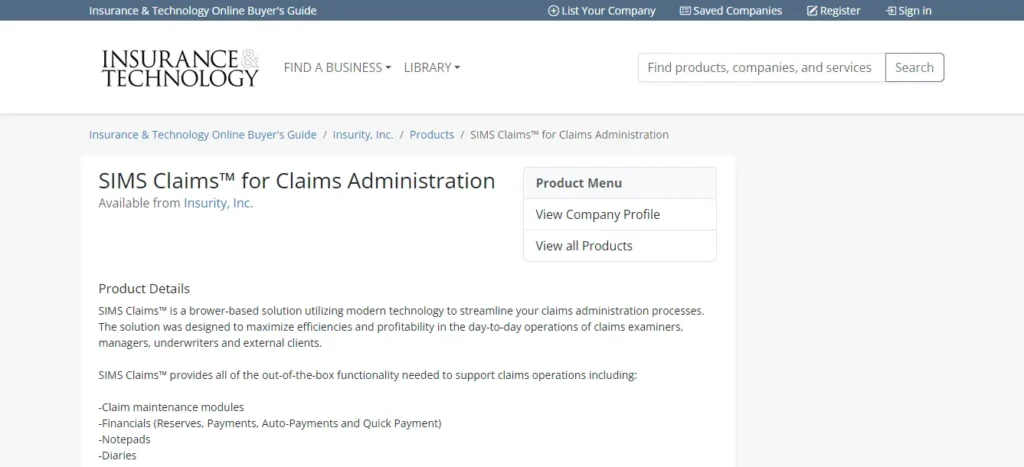
Sims claims by insurance is a highly configurable claims management solution for p&c insurers. Provides end-to-end information management capabilities with a focus on flexibility and user experience.
FEATURES –
• workflow: prepare systems with automated workflows and work assignments.
• detailed reporting and analysis: gain insight into claims and performance.
• mobile access: mobile devices can be used to access the platform on the go.
• integration with planning and billing systems: ensure data flows seamlessly between systems.
PROS –
• highly customizable to meet specific business needs.
• a strong focus on the user experience, providing an intuitive interface.
• mobile-friendly, allows flexibility and accessibility.
CONS –
• implementation can be very time consuming and requires careful planning and management.
• high cost for advanced features and customization options.
9. Lexisnexis claims compass

Lexisnexis claim compass provides comprehensive claims management tools focused on data analysis and fraud detection. This solution helps insurers manage claims more efficiently and reduces the risk of fraudulent charges.
FEATURES –
• advanced data analysis: use sophisticated analytics to gain insights into claims and performance.
• fraud detection tools: use fraud detection and reduce fraud claims through comprehensive analytical techniques.
• integration with lexisnexis data services: use new data sources for advanced claims processing.
• automated workflows: simplify the claims process with automated workflows and work activities.
PROS –
• strong focus on data analytics and fraud detection, providing valuable insights.
• effective fraud detection helps reduce the incidence of fraud cases.
CONS –
• can be expensive, especially for smaller insurers.
• requires integration with other lexisnexis services for complete functionality, potentially increasing overall costs.
10. Claimpilot

Claimpilot is a cloud-based claims management solution designed for small and medium-sized insurers. It provides seamless communication and robust functionality for handling claims, making it ideal for businesses looking for cost-effective solutions
FEATURES –
• automated task assignment: effectively distribute tasks to the right team members.
• real-time reporting: monitor feedback performance and identify challenges.
• mobile access: mobile devices can be used to access the platform on the go.
• integration into system structure: ensure seamless data flow between systems.
PROS –
• user-friendly interface simplifies the claims process.
• provides robust services at affordable prices, affordable to small insurers.
• mobile-friendly, allows flexibility and accessibility.
CONS –
• scalability is limited for large insurers due to their focus on small to mid-sized businesses.
• basic compared to advanced solutions may restrict its use for complex feedback systems.
Conclusion
In conclusion, selecting the best insurance claims management software is vital for any insurance company aiming to optimize its claims process, enhance operational efficiency, and improve customer satisfaction. The right software can automate tasks, reduce errors, and streamline workflows, ultimately leading to a more effective and responsive claims management system.
By carefully evaluating the features, benefits, and pricing of the top options available, you can find a solution that meets your specific business needs and goals. Investing in the right claims management software not only boosts your company’s productivity but also ensures a smoother, more efficient experience for your clients.
FAQ’s
1. What is insurance premium management software?
Insurance claims management software is a tool designed to automate and streamline the claims process from initial reporting to settlement, increasing efficiency, accuracy and customer satisfaction reduces manual data entry, reduces errors and provide valuable insights through data analysis.
2. How does insurance claims management software improve efficiency?
Insurance claims management software improves efficiency by automating repetitive tasks and workflows, reducing the time it takes to process claims. Ensure that every step from initial reporting to final settlement is handled quickly and efficiently. This results in faster processing and resolution of claims, increasing overall operational efficiency.
3. Is insurance premium management software suitable for small insurers?
Yes, there are solutions specifically designed for smaller insurers like claimpilot. This solution provides robust functionality at an affordable price, making it accessible to small businesses. They provide essential features such as automated job assignments, real-time reporting, mobile access, etc., to ensure proper claims handling and processing exactly
4. What factors should i consider when choosing insurance claims management software?
Consider your specific business needs, budget, flexibility, integration capabilities, and level of customer support when choosing insurance claims management software look at software features, ease of use , and customization options to ensure it meets your business objectives and improves your content management system.






